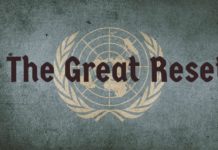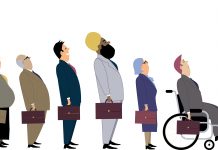In part one of this series, I attempted to outline some important agenda items that may take shape over the next few years because of the COVID-19 pandemic. Klaus Schwab, head of the World Economic Forum and author of COVID 19: The Great Reset, has stated several times that the crisis presents the opportunity to enact changes that would otherwise seem inconceivable, and to push stalled agendas forward. While it is hinted at the beginning of the book that some of these “stalled agendas” may revolve around the U.N. 2030 Sustainable Development goals, for the rest of this review, we can be sure this is the main idea driving everything. Schwab concludes the book by admitting as much. On page 289, he states that “there is an opportunity to embed greater societal equality and sustainability into the recovery, accelerating rather than delaying progress towards the 2030 Sustainable Development Goals and unleashing a new era of prosperity.” The essence of The Great Reset, he writes, is to replace failed ideas and repair the fault lines in our interconnected systems, which enabled the crisis to wreak global devastation. What fault lines? What failures? On page 187, Schwab admits what we all know. COVID-19 is not a major crisis in terms of mortality rates as it is one of the least deadly pandemics we have seen in the past 2000 years. Perhaps the real failure and fault lines lie with the global governments who insist there is something wrong with our world and feel the need to remake it in their image.
Defining The Macro Reset
Macro, in terms of describing societal structures, refers to the socioeconomics, wealth and poverty levels, infrastructure systems, and ethnicities within the larger culture. To view the COVID-19 issue from a macro-level is to look at how our world is interconnected, and how the crisis affects the way our world functions. Schwab breaks this view down into three main categories, interdependence, velocity, and complexity. These three writes Schwab, affect us all in one way or another.
Simply put, interdependence refers to the way our technological world has connected us all and made our systems depend on one another.
“An interdependent world is a world of deep systemic connectivity, in which all risks affect each other through a web of complex interactions. In such conditions, the assertion that an economic risk will be confined to the economic sphere or that an environmental risk won’t have repercussions on risks of a different nature (economic, geopolitical, and so on) is no longer tenable. (Schwab, 2020)
Velocity refers to the speed of the technological process and its contribution to our interconnectedness, and the immediate expectations of receiving goods and services because of such progress. Schwab is hinting that the speed at which the pandemic engulfed the world has much to do with the way technology has created this culture, and how our dependence on each other reverberates the consequences brought on by the pandemic. Complexity refers to things we find difficult to understand. In terms of the system in which we live, according to Schwab, complexity alludes to a lack of understanding of the necessary connections which must exist for our world to operate the way it does.
Key statements and ideas alluded to by Schwab under each of these categories, which bring more suspicion to the pandemic, will be examined in this section of the review. It is becoming increasingly difficult to come to any other conclusion, especially in light of gain of function research revelations, that this crisis was not deliberately created.

Interdependence
Understanding the various cultures of the world is important. Much of the planet is made up of collective societies where individual rights and responsibilities are not only swept aside but in some cases, aren’t even recognized. That is what has separated, and to a great extent, made the United States the exceptional country it is. True freedom only exists when the individual is free to accept the consequences of his or her actions. This also means that as individuals, we are free to weigh the risks or face the responsibility for failing to do so when we face any crisis. COVID-19 has demonstrated this with the collective actions taken by governments to “slow the spread.” For instance, Schwab insists on page 27 that the virus itself, its deadliness, and the speed at which it moves is greatly exacerbated by our own behaviors on the collective level. Will we fall in line with the recommended mandates? Failing to do so, or highlighting people’s freedom to choose for themselves, is one of the fault lines, or failed ideas that the so-called pandemic exposes. Weighing risks on the individual level, and assuming these actions will echo collectively, is, according to Schwab, an artificial construct.
In an interdependent world, risks amplify each other and, in so doing, have cascading effects. That is why isolation or containment cannot rhyme with interdependence and interconnectedness. (Schwab, 2020)
Mask and vaccine mandates bring this issue front and center. Viewing risk at the individual level and allowing people to accept the consequences of assuming said risk, Schwab argues, “harbors the potential to create ricochet effects by provoking other risks.” In other words, the interdependent nature of the world he describes highlights the idea that an individual’s refusal to go along with the collective course of action leads to the further spread of the infection. This is a concept that is easily understood, however, Schwab also argues that a snowball effect of sorts takes place and that the ricochet effects expand out into the macro-environment as opposed to staying on the individual level. With the pandemic highlighting the failure of global government, social instability, unemployment, the global economy, and “involuntary immigration,” Schwab is arguing that the assumption we can make our own decision and live with the consequences on the individual level, is a false idea.
These are not new concepts. Viewing this from the perspective that one of the agenda items is “accelerating rather than delaying progress towards the 2030 Sustainable Development Goals,” it can be argued that those pushing the climate change agenda have long blamed American individualism and consumption patterns as the problem. Our universities have been conditioning students to view America as a selfish nation that exploits the world’s resources for our own benefit. During the Obama administration, we heard terms like Climate Debt. That America owes the world because of the damage our individualistic, selfish culture causes the environment is an argument still being made. One possible solution, being argued by the left, is to allow in climate migrants. This is the real interconnectivity of our world and the manner in which the current crisis allows stalled agenda items to move forward. As noted in part one, immigration to the United States was dramatically altered with the Immigration Act of 1965.
To touch briefly on the idea of a failed global governing structure, Schwab alludes to the idea of world leaders in science, business, economics, medicine, and government not being able to cross their so-called, disciplinary boundaries in coming up with solutions. This led to confusion about the consequences of re-opening the economy or keeping it closed. Clearly, Schwab is arguing for the need for a global structure to make these decisions, collectively. Each nation, in this sense, can be seen on the individual level and making economic decisions that serve only their economic interests can have consequences in our interconnected world.
Velocity & Complexity
This is an interesting section as the speed at which COVID-19 engulfed the world, and how difficult it is for people to understand the concept of exponential growth, is discussed. What makes it so interesting is that Schwab refers to COVID-19 as a White Swan as opposed to a Black Swan event. What is the difference? The media successfully portrayed COVID-19 as a life-threatening disease that would decimate world populations, while persuading many millions of unsuspecting people to wear face masks and risk unproven vaccines out of fear. “The spread of infectious diseases,” writes Schwab, “has a unique ability to spread fear, anxiety, and mass hysteria.” A Black Swan event is one that is unpredictable and unsuspected. Only something that appears so unexpectedly could cause such economic hardship and destruction on the individual level, right? Several times throughout the book, Schwab highlights the true nature of COVID-19 by stating it is nowhere as near deadly as past pandemics and “that world populations will not be decimated, and mass famines will not be induced.” COVID-19, writes Schwab, is a White Swan event, which is the exact opposite of a Black Swan.
The timing of this book is curious. If it were in response to a pandemic that erupted spontaneously and unexpectedly, it seems it would have been written long after the consequences were studied. Instead, the consequences seem anticipated as many of the proposed solutions are admittedly, “pre-existing dangers that we’ve failed to adequately confront for too long.” On page 31, Schwab asks why COVID-19, despite its less dangerous nature, should not present the same opportunities for massive social and economic changes that were spurred on naturally by other pandemics which can be rightly called Black Swan Events. Written just a few months after the onset of the pandemic, all the causes, consequences, and possible solutions are all mapped out as if they were predicted.
The velocity at which the pandemic unfolded globally led to the complex issues of insufficient testing capabilities, overwhelmed medical systems, and a failure of politicians to understand the nature of the situation, and which road they should take in solving it. If Schwab is referring to this as a White Swan event, to what extent were these outcomes, and others that we have failed to confront for too long, anticipated? Did they know they would be able to move quickly with certain agenda items due to the confusing nature of a virus which allegedly, (page 29) according to the news, was infecting so many so quickly? This question stands to reason when you consider gain of function research and the fact that Schwab reminds us on page 28, that the World Health Organization and individuals like Bill Gates have been warning us of an event like this for years.
According to an article published at PricipaScietifica.com, in August 2021, Bill Gates has been working with the Chinese Communist Party studying bat coronaviruses since 2015. How, and why, would Bill Gates be warning us about a pandemic, described by Schwab as a White Swan event, if he didn’t know it was going to happen? Theoretically, someone immersed in the study of viruses would certainly be able to make such predictions based on probabilities and history alone, however, the precision and quickness in which all the opportunities to push the Sustainable Development Agenda are taken advantage of, is too suspect.
Gain-of-function research is described as biological research aimed at increasing the virulence and lethality of pathogens and viruses. Dr. Anthony Fauci has been on the hot seat for his role in funding gain of function with taxpayer dollars. This, along with Bill Gates’ connection to the Chinese raises many questions despite the legitimate reasons gain of function research may be conducted.
To conclude this portion of COVID-19 The Great Reset review, Schwab has stated several times that the pandemic is a perfect example of a crisis that should not go to waste. On page 28, he says something that should raise everyone’s eyebrows. He states COVID-19 is not a Black Swan event alone, but the events that follow will be. How does he know this? This statement alone suggests that there was a solid understanding of how COVID-19 would affect the three areas of interdependence, velocity, and complexity Schwab says are central to all of us. This leads one to suspect that this issue was thoroughly studied beforehand. Is it possible that such studies can take place with the best interest of humanity at heart? Yes, but the nature of Schwab’s demeanor and his comment referring to the consequences being Black Swan events of their own, bring suspicion to the whole issue. This suggests two possibilities. One, the virus was manufactured through gain of function research and deliberately released on the public with anticipated opportunities to enact change, or it was a natural event where they deliberately manipulated the consequences through forced lockdowns, so they can destroy the economy and push the same agenda items. Agenda items mind you; Schwab keeps stating have been ignored for too long.
Stay tuned for the next section where the economic reset will be discussed.
























